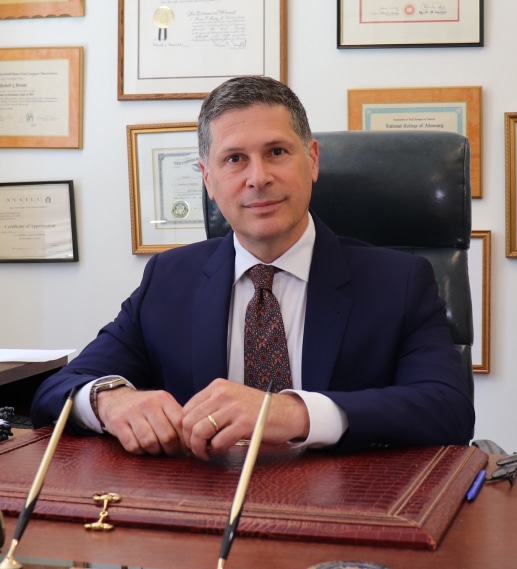Home » New York City Personal Injury Lawyer » New York City DUI Accident Lawyer
 Quicklinks
Quicklinks
You had a great time at a party. Left in a good mood. But that happy feeling quickly disappeared when you spotted flashing red lights in your rearview mirror.
Thoughts race through your head: why am I getting pulled over? Did I have too much to drink at the party? What do I do if they detect alcohol on my breath?
Understanding your rights under the law is critical when you are facing a driving under the influence (DUI) charge so you don’t unknowingly hurt your own case. States have their own driving laws and the penalties for DUI vary from state to state.
Injured In A DUI Accident And Have Questions? We Can Help, Tell Us What Happened.
DUI accident attorneys at New York’s Proner & Proner have in-depth knowledge of the DUI laws in New York and are skilled in building the best possible defense.
Blood Alcohol Concentration (BAC) In DUI Accidents
Blood alcohol concentration (BAC) is the percentage of alcohol that is present in the bloodstream. Blood tests and breathalyzer tests are administered by law enforcement officers and medical professionals to determine a person’s blood alcohol concentration.
When an individual has a BAC of 0.08% or more while they are operating a motor vehicle or boat, that individual may be charged with driving under the influence (DUI) of alcohol. It is important to note that, in New York, a driver may be charged with a DUI based on their BAC even if their driving ability was not impaired. This can be confusing; the DUI attorneys at Proner & Proner explain your rights under the law, answer your questions, and fight aggressively on your behalf for the best possible outcome.
New York’s Zero Tolerance
New York is a “zero tolerance” state, meaning that it does not tolerate underage drinking — or underage use of illegal prescription drugs — and driving. In New York, underage drivers — those who are under the age of 21 years — are prohibited from operating a motor vehicle with a BAC of 0.02% or more.
If an underage driver operates a motor vehicle with a BAC of 0.02% but not more than 0.07%, they must appear at a Department of Motor Vehicle hearing. If the charge is supported, the underage driver will have their license suspended for a period of six months, and face a $125 penalty and a $100 suspension termination fee.
Can I Refuse A Breathalyzer Test In New York?
Many drivers are unclear about whether or not they must submit to a breathalyzer test — or another form of chemical testing — if they have been charged with driving under the influence (DUI).
Law enforcement officers can not force you to submit to a breathalyzer test. However, under New York’s implied consent laws, when you applied for a drivers’ license in the state, you agreed to take chemical tests of your blood, breath, or urine to determine alcohol or drug content when a law enforcement officer asks you to do so.
So, while police officers cannot make you submit to a breathalyzer or other chemical test, there are legal consequences for refusing. Those penalties are as follows:
- First offense:
License suspension for one year
- Second offense:
License suspension for a period of 18-months with a prior refusal or with a DUI conviction within the past 5 years
- Third offense:
License suspension for a period of 18-months with a prior refusal or DUI conviction within the past 5 years
If, within the past four years, a driver has had either two DUI convictions, two refusals, or one refusal and one conviction, their drivers’ license can be permanently revoked.
Related Pages
New York Office
122 E. 42nd St #2015, New York, NY 10168
Email: info@prolaw1.com
Phone: (212) 986-3030
Successful Cases
$6,900,000.00
Female, Male: Premises Liability
$3,500,000.00
Female, 43: Premises Liability
$3,500,000.00
Female, 33: Serious Personal Injury
Testimonials
Got into a motorcycle accident and went to Proner&Proner. I received great services and excellent results, I would definitively recommend the services. It was a great experience for me, A++ attorneys.
– GOOGLE REVIEWER / CLIENT
When I felt I needed legal support after a motorcycle accident, I sought out an attorney who was a motorcyclist as well. Fortunately, I found Mr. Proner. The concern I received was a comfort. The firm’s contact with me while working on my behalf was reassuring and the results certainly made a bad experience easier to put behind me. My gratitude to Proner & Proner.
– GOOGLE REVIEWER / CLIENT
Mitchell Proner is an amazing and very experienced trial lawyer, who takes care of his clients. He represented me in a car accident case, kept me very informed during the lengthy legal process and got me the settlement that I expected. His friendly office staff was always willing to assist and answer any questions I had. I recommend Mitchell Proner to all my friends and family!
– GOOGLE REVIEWER / CLIENT
I am very grateful for the services they were very quick and they dealt with my case right away. Thank you very much.
– GOOGLE REVIEWER / CLIENT
Mitchell Proner is an excellent lawyer. He took our case and did the right thing. We recommend him 100% to anyone. His staff are professionals and they care about their clients.
– GOOGLE REVIEWER / CLIENT
Greatest Lawyers I ever had. Answer any and every question I ever had. They treated me as one of the family. I can’t say enough about this firm. Thank you so much for all you guys did.
– GOOGLE REVIEWER / CLIENT
Awesome experience, excellent service, very professional and fast resolving my case. My number one attorney – definitely recommended more than once. Thank you!
– GOOGLE REVIEWER / CLIENT
New York Penalties For Driving Under The Influence (DUI)
New York state has stiff penalties for individuals who are charged with driving under the influence (DUI) and they are as follows:
- First DUI Offense:
mandatory fine of $500-$1,000, maximum jail time of one year, license revoked for at least six months
- Second DUI Offense in ten years:
mandatory fine of $1,000-$5,000, maximum jail time of four years, license revoked for at least one year
- Third DUI Offense in ten years
mandatory fine of $2,000-$10,000, maximum jail time of seven years, license revoked for at least one year
The penalties for driving under the influence increase with each subsequent offense. Because of this, it is best to seek the advice of an attorney who is experienced in handling DUI charges in the state for the best possible outcome in your case.
Facing A DUI Charge In New York? Don’t Panic. Call Us Instead.
Panic and fear are the most common responses when facing a DUI charge. It is completely understandable. A DUI charge is a serious offense.
But panic and fear won’t help you beat the charges against you. We will. At Proner & Proner, our skilled DUI accident attorneys are knowledgeable, skilled, and experienced.
The Proner & Proner legal team will review your case, answer your questions, discuss your options, and aggressively fight the charges brought against you. With a demonstrated track record of success, we are by your side every step of the way. Schedule a consultation with a member of our team today to discuss your DUI accident case.

Frequently Asked Questions About New York DUI
A charge of driving under the influence (DUI) of alcohol or drugs is a serious offense. While the laws regarding drinking and driving may seem fairly straightforward, things become more complicated when there is an actual charge. The circumstances surrounding every DUI are unique, as are the facts in each case.
An experienced DUI accident attorney can assess the facts specific to your case, and develop a strategic defense tailored to your situation. Consulting with a skilled DUI attorney is an advisable first step so that you can make an informed decision. The DUI attorneys at Proner & Proner offer a free case evaluation and are available to answer questions about your DUI case.
In New York, the guideline for law enforcement officers to measure your BAC is within two hours of your DUI arrest, or within two hours from when a portable breath test detected alcohol on your breath.
In The Press



Office Location
Even though the firm has successfully represented clients from five continents and over 30 jurisdictions, Proner & Proner serves New York personal injury clients in all five boroughs from our office in Midtown Manhattan.

